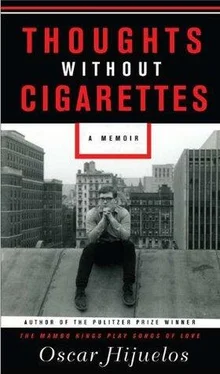Then morning came, and a few farmers, black cigarillos in their lips, boarded the bus with caged hens, and as roosters crowed, vendors selling little paper cups of coffee came down the aisle, and the music of a radio — a woman’s mellifluous voice, perhaps someone like Celia Cruz or Elena Burke — sounded from the doorways of the houses: I can remember thinking, sick as I felt, that I had been traveling through an immensely interesting tunnel, like that of an arcade attraction in an amusement park, but one that went on and on, seemingly forever.
Once we arrived in Holguín, however, I got better, attended to by my affectionate aunt Cheo and her adolescent daughters, Miriam and Mercita. Our days together went happily enough. Always treating me kindly, they did their best to keep their youngest cousin, a few months short of turning four, well-fed and entertained — oh, but we played in the back, where a mango tree stood, lizards crawling about and a smell of jasmine and wildflowers so strong they left one yawning and sleepy. And while their modest house was just a one-story solar and nothing special on a nondescript side street in Holguín, I’ve always considered it my own little piece of Cuba.
Though I can’t describe how the rooms were laid out, in which part of the house I slept, or even where the baño with its toilet — what my mother always called the “ inodoro ”—had been situated (think it was in its own shed, just off the back patio, where there was possibly a shower as well), I do know that the mornings smelled wonderfully from the fragrant and dense blessings of a nearby soda cracker factory, and that down the way, along a descending cobblestone street, on a shady corner, stood a bodega where the local campesinos , coming into town on donkeys and horses, would stop to have a few drinks, its wooden floor reeking of pungent beer. A mulatto in a straw hat passed his days there, in a narrow space behind a juice-dripping counter, chopping up pineapples, splitting coconuts, and occasionally brandishing on the tip of a machete some chunk of mango or papaya for me to eat. I’d go there with my brother in the afternoons and marvel at the thin and bony hunched-over farmers, whose faces seemed half-hidden under their hats, and at the way sunlight poured in from the back through an open door, casting their shadows into infinity.
For their part, those men, who’d grown up as rustics like my father had on a farm, chewing on their cigars and speaking as if their mouths were stuffed with cotton, must have been amused by the sudden appearance of a small blond boy in their midst. “Cheo’s nieto ,” it was explained, the one who came down from New York with his mother, you know, that good-looking brunette who left Cuba with that fellow Pascual and who, however often she smiles, must have regretted it, por Dios! — it was written all over her face. They might have rubbed their eyes a few times before getting a second look at me (the story of my life); it took them a while to absorb that such a towheaded boy could have been the offspring of an Hijuelos from Jiguaní. Those campesinos would have probably known my father from the old days before he came to the States, when he used to ride the countryside on a horse himself. They would have recalled his languid demeanor and friendly but sad expression, and would have appreciated and respected me and my brother for the very fact that my father’s family had been in Oriente for over a hundred years. And in those days when every Cuban from Holguín and Jiguaní knew each other, they would have likely remembered my mother from earlier times, from seeing her at Carnival, or from the local dance halls where she, in her late adolescence and young womanhood, had so bloomed as a dancer.
And yet, however warmly those campesinos might have thought of my mother, they would have still puzzled over the fact that I didn’t look Cuban at all.
But, even if they may have been at a loss for what to make of me, they were friendly. The owner always prepared the most delicious Cuban fruit shakes for my brother and me, his machete cleaving into the counter with sharp whacks, the juices dripping down, that taste of what I suppose now had to be batidas , which might have been spiked with a little Cuban rum for flavoring, ever so delicious on my tongue. Now and then, one of those fellows would take my brother and me outside and put us on his horse, and back and forth we would go, pulled along the street, jostling by the open-shuttered windows and doorways of the houses and waving at everyone, my head muzzled in its bristly mane, people smiling at us just because we were children.
Later we’d play hide-and-seek behind the trees and go charging like little bulls through the sheets that had been hung up to dry alongside the houses, or we’d sit by my aunt’s doorway watching the black laundresses— negritas buenas , as my mother called them — go by with their baskets balanced on their heads. About a block or so away, there stood an icehouse — what better thing was there to do than stand by its entrance to cool off or to chew on some of the chips that had dropped from those perspiring blocks of ice into the gutter? I seemed to be always thirsty, so my brother has told me — several times he had to stop me from sipping water from a curbside trough, and it seems that early on, I had already acquired the nervous habit of eating anything offered to me — deep-fried banana fritters, a piece of raw sugarcane, or a strip of bacalao , or salted cod (which I had never really liked but ate anyway). One afternoon, while sitting on the curb, I watched my brother, fooling with a hose in front of Cheo’s house, turn its gushing spout on a very dapperly dressed man, all in white and wearing a lacquered cane boater, as he rode by on a bicycle. With my brother spraying him with abandon, that scene, at least in memory, played out like something from a 1930s Max Roach comedy: He got off that bicycle fuming and, scolding José, began to chase him around in circles, my brother keeping just ahead of his grasp, until my mother, hearing the commotion, stepped from the doorway and, in her loveliness and charm (or outrage that a grown man would harass a boy, however mischievous, of eleven or so) calmed him down, his anger dissipating in a way that seemed to elude her sometimes when it came to our father, Pascual.
Of course, we’d come to visit my aunts, Cheo, with whom my mother and I stayed, and her oldest sister, María, in whose home my brother usually slept, a few streets away. If there’s any one thing I can tell you about Cheo, it would come down to her kindness and demure, self-effacing manner, though it’s my guess that there was a lot more to her moods than just that. But as a boy, the only things that registered with me were her kisses, her embraces, her generally sweet and maternal ways. I didn’t know that she was a recent widow, nor that she spent her days working in a department store along one of Holguín’s shopping streets, and that her life must have been difficult, what with two daughters to look after and support. She never let on about her grief, however, not to my brother and me, and, in any case, seemed to cope with her circumstance by keeping busy — cooking, sewing, cleaning the house, and praying — yes, she was the most religiously devout of my mother’s sisters. Mainly she oozed affection, being the sort of woman who spoke only endearments, as with “What do you want, my love?” and “Are you hungry, mi vida ?” and always with the sweetest smile. I sometimes slept alongside her at night—“ Somos familia ,” “We’re family,” she’d say quietly, and “ Soy tu tía ,” “I’m your aunt,” as she’d hold me close, and I’d half strangle her, returning her affections, so precious and warm she seemed.
Читать дальше












